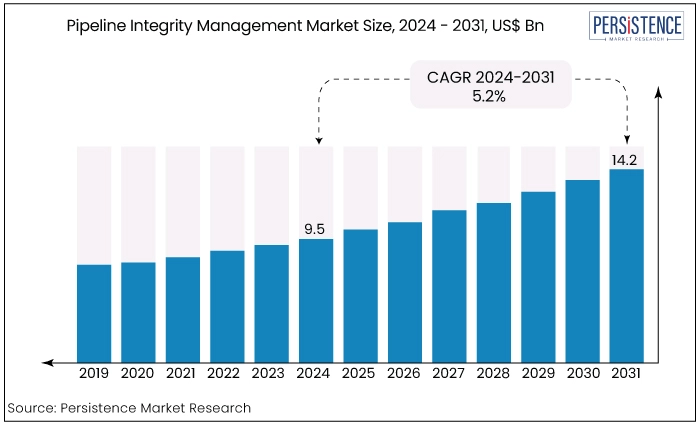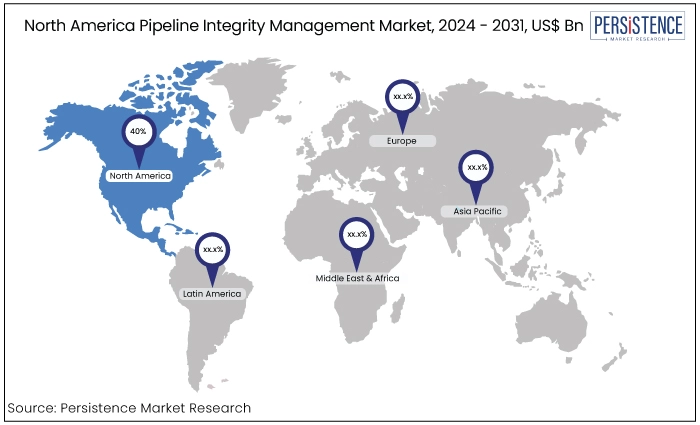ID: PMRREP34756| 188 Pages | 2 Sep 2024 | Format: PDF, Excel, PPT* | Energy & Utilities

The pipeline integrity management market is estimated to reach a valuation of US$14.2 Bn from the value US$ 9.5 Bn recorded in 2024. The market is projected to at a CAGR of 5.2%, during the forecast period from 2024 to 2031.

Key Highlights of the Market
|
Market Attributes |
Key Insights |
|
Pipeline Integrity Management Market Size (2024) |
US$9.5 Bn |
|
Pipeline Integrity Management Market Size (2031) |
US$14.2 Bn |
|
Forecast Growth Rate (CAGR 2024 to 2031) |
5.2% |
|
Historical Growth Rate (CAGR 2019 to 2023) |
4.6% |
|
Region |
Market Share in 2024 |
|
North America |
40% |
The region's emphasis on mitigating environmental impact and averting pipeline breakdowns reinforces the ongoing implementation of pipeline integrity management (PIM) services. Furthermore, increasing crude oil extraction in the region is expected to stimulate the need for PIM services.
North America accounted for almost 38% of the total revenue in the pipeline integrity management industry. This regional market is distinguished by its enormous network of oil and gas pipelines and a rigorous regulatory framework.
The United States currently has the largest market for pipeline integrity management in North America and is projected to maintain its leading position in the coming years. The country's extensive network of pipelines transporting oil, gas, and chemicals necessitates the implementation of complete integrity management solutions.

|
Category |
Market Share in 2024 |
|
Location - Onshore |
65% |
Based on location, the market classified into onshore and offshore. Among these, the onshore segment leads the market with 65% share.
The onshore segment involves using pipelines on land to transfer oil, gas, and other substances. This segment encounters distinct problems such as adverse environmental conditions, conflicts related to land usage, and the requirement for diligent monitoring and maintenance. Pipeline integrity management services can tackle these difficulties using a blend of inspections, corrosion control, and leak detection technology.
|
Category |
Market Share in 2024 |
|
Service - Inspection Service |
62% |
Based on service, the pipeline integrity management market is classified into inspection service, cleaning service and repairs & refurbishments. Among these, inspection service dominates the market accumulating large share.
Inspection services to account for over 62% of the total revenue share. This phase involves identifying and evaluating potential risks and damages to the pipeline infrastructure. The growth of this segment has been substantial. It is primarily due to the necessity for frequent inspections to guarantee adherence to safety regulations and prolong the durability of pipeline resources.
Cleaning services are essential for ensuring the optimal functioning and safety of pipes. Regular maintenance aids in the prevention of obstructions and accumulation that may result in corrosion or leaks. The increasing recognition of the significance of pipeline cleanliness is anticipated to impact market expansion positively.
Pipeline integrity management (PIM) is the ongoing assessment of the pipeline utilized to transfer oil and natural gas to ensure the safety and dependability of its operations. Public safety and environmental considerations are crucial during pipeline construction. These pipelines transport combustible gases and liquids at elevated pressures, so any leakage or accidents during operation would result in significant environmental and human losses.
Pipeline owner-operators oversee pipeline integrity management (PIM) initiatives. The management programs encompass all stages of the pipeline life cycle. These stages include conceptualization, engineering, design, construction, operation, inspection, and repair/replacement when needed.
The main objective of pipeline integrity management systems is to preserve pipelines crucial in transporting various liquids over long distances such as water, gas, and oil. The significance of pipeline integrity cannot be overstated.
Any compromise in its functioning or safety can result in severe consequences such as environmental damage, financial losses, and threats to public safety. The pipeline integrity management systems market caters to stakeholders such as oil and gas corporations, pipeline operators, regulatory bodies, engineering firms, and technology providers.
Robust pipeline integrity monitoring is increasingly vital as global energy demand escalates and existing infrastructure ages. This stimulates innovation and attracts investment in this dynamic commercial area.
During the historical period from 2019 to 2023, the pipeline integrity management market experienced steady growth driven by increased regulatory requirements and the need for enhanced safety and efficiency in pipeline operations.
The oil and gas industry mainly reliant on extensive pipeline networks pushed for advanced integrity management solutions to prevent leaks, failures, and environmental hazards. Technological advancements in inspection tools such as intelligent pigs and sensor technologies enabled better monitoring and maintenance of pipelines.
Post-2024, the market is anticipated to witness accelerated growth due to several key factors. The global transition toward clean energy sources and expanding pipeline networks for transporting renewable energy materials including hydrogen and biofuels will drive demand for advanced PIM solutions.
Increased pipeline modernization and digitalization investments, incorporating technologies like IoT, AI, and machine learning will further enhance monitoring and predictive maintenance capabilities. Also, the growing emphasis on data analytics for proactive decision-making and risk management will also contribute to the market's expansion making PIM solutions crucial for maintaining pipeline safety and efficiency.
Data Security and Privacy Concerns
Data security and privacy concerns represent another growth restraint for the pipeline integrity management market. The increasing reliance on digital technologies and IoT devices for monitoring and managing pipeline integrity introduces risks related to data breaches and cyberattacks.
PIM systems collect and transmit vast amounts of sensitive operational data making them attractive targets for malicious actors. Ensuring the security of this data requires robust cybersecurity measures, which can be complex and costly to implement.
Organizations may need help safeguarding their data against potential threats leading to reluctance to adopt advanced PIM solutions. Moreover, regulatory requirements for data protection can add additional layers of complexity and cost further inhibiting market growth.
High Implementation Costs
High implementation costs significantly restrain the growth of the pipeline integrity management (PIM) market. Advanced PIM solutions require substantial upfront investment, including sophisticated inspection tools, sensor networks, and data analytics platforms.
Acquiring and integrating the technologies and ongoing maintenance and training expenses can be prohibitive especially for small operators or those in emerging markets with limited financial resources.
The complexity of implementing comprehensive PIM systems may lead to further expenditures for customization and system integration. These high costs can deter potential adopters and slow the adoption rate of PIM solutions particularly in industries or regions where budget constraints are a significant concern.
Integration of Artificial Intelligence and Machine Learning
The integration of artificial intelligence (AI) and machine learning (ML) presents a significant opportunity for the pipeline integrity management (PIM) market. As pipelines become increasingly complex and data-intensive, leveraging AI and ML can transform how pipeline integrity is monitored, analysed, and maintained.
AI and ML algorithms can analyse vast amounts of data collected from various inspection technologies such as smart pigs, sensors, and drones to identify patterns, predict potential failures, and optimize maintenance schedules.
AI-driven predictive analytics enable accurate forecasting of pipeline issues by analysing historical data and real-time sensor inputs. This proactive approach allows for early detection of anomalies such as corrosion or leaks before they escalate into major problems reducing the risk of costly failures and environmental hazards.
AI and ML technologies can support the development of advanced decision-support systems, providing operators with actionable insights and recommendations for pipeline management. This capability can help organizations optimize their maintenance strategies, allocate resources more effectively, and ensure compliance with regulatory standards.
Adopting AI and ML in pipeline integrity management offers a transformative opportunity to enhance pipeline operations' accuracy, efficiency, and safety driving market growth and innovation.
The competitive landscape of the pipeline integrity management (PIM) market features several prominent players including Emerson Electric, ROSEN Group, TÜV SÜD, and SGS. These companies dominate the market by offering various PIM solutions including inspection technologies, risk assessment tools, and maintenance services.
Competition is driven by technological advancements with firms investing in smart sensors, AI-driven analytics, and advanced inspection techniques to enhance pipeline safety and efficiency. Strategic partnerships, mergers, and acquisitions are expected as companies seek to expand their capabilities and market presence.
Emerging players and specialized firms also contribute to the competitive dynamics, focusing on niche markets or offering unique technological solutions to address specific industry needs.
Recent Industry Developments in the Pipeline Integrity Management Market
The market is estimated to reach a value of US$14.2 Bn by 2031.
The market is projected to exhibit a growth rate of 5.2% over the forecast period.
Baker Hughes, Enbridge, GE, Schneider Electric, TC Energy are some of the key market participants.
North America dominates the market accounting for high market share.
|
Attributes |
Details |
|
Forecast Period |
2024 to 2031 |
|
Historical Data Available for |
2019 to 2023 |
|
Market Analysis |
US$ Billion for Value |
|
Key Regions Covered |
|
|
Key Market Segments Covered |
|
|
Key Companies Profiled in the Report |
|
|
Report Coverage |
|
|
Customization & Pricing |
Available upon request |
By Location
By Service
By Region
Delivery Timelines
For more information on this report and its delivery timelines please get in touch with our sales team.
About Author